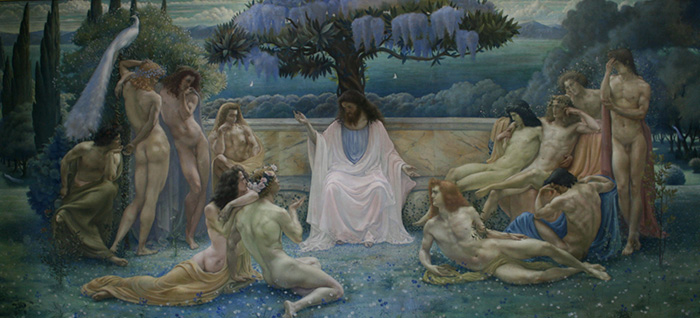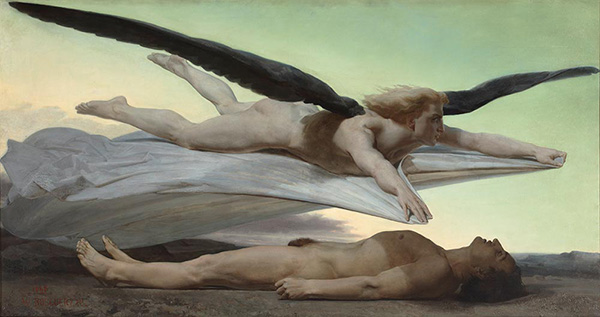Fae Brauer, “Flaunting Manliness: Republican Masculinity, Virilised Homosexuality and the Desirable Male Body,” Australian and New Zealand Journal oMaf Art, Vol. 6, Issue 1 (2005), p. 23.
“France,” declared the Third Republic’s demographer, Jacques Bertillon, is ‘plagued by the crimes of Onan* and sins against
Adolphe William Bouguereau, Equality Before Death, 1848
|
nature.” Effeminancy, waning virility and both “perverse” and “inverse”** sexual practices had all wrought, Bertillon reported to the Depopulation Commission, a national crisis. They had caused the French birth rate to lag dangerously behind that of other countries, particularly the newly-formed German empire. They had produced a deep-seated paranoia that, in the succinct words of Alain Corbin, “the virile member would not rise at the appropriate moment.” To promote republican masculinity and redress the depopulation crisis, Bertillon, supported by some five hundred French natality leagues, heroised fathers of large families as selfless “manly patriots. Bachelors were reviled as their opposite: selfish, unpatriotic “inverts”, the term most commonly used for homosexuals, tainted by onanism, sodomy and unmanly effeminacy. Following Ambroise Tardieu’s survey, “inverts” were not just effeminate and unmanly but somatically stigmatized with “pointy penises” and “flaccid” rather than “bulging buttocks”. Spurred on by the outcome of the Oscar Wilde Trials, natality leagues lobbied vehemently for prosecution of any public manifestation of “inversion”, particularly in the nation’s decadent capital. Yet paradoxically the most startling feaure of Parisian homosexual culture is not how invisible it was but, on the contrary, how visible it became. Despite the neo-regulationist policing of desire, the performance of “inverted” sexualities flourished. For those who knew how to look, they were flaunted in the full exhibitionist sense of the word, not just on the boulevards and in the pissoirs***, but in the high cultural forums for art.
*Onan was a Biblical figure in the book of Genesis killed by God for masturbation.
** “Inverse” was a 19th century term for homosexual.
*** “Pissoirs,” were, as the name suggests, public urinals placed on the streets of Paris in the late 19th century as part of the reform of the streets pushed by Haussman.

Jean Delville, The School of Plato (1898)
This is an example of the homoerotic imagery that appeared in French art late in the 19th century
